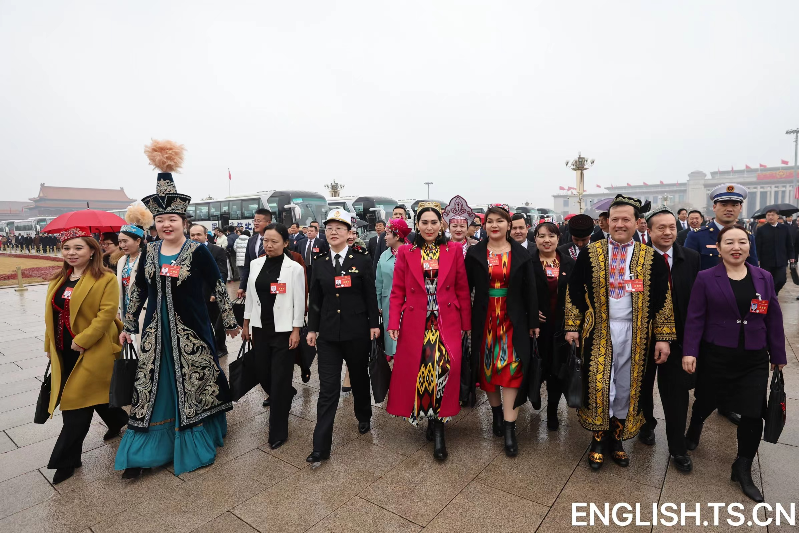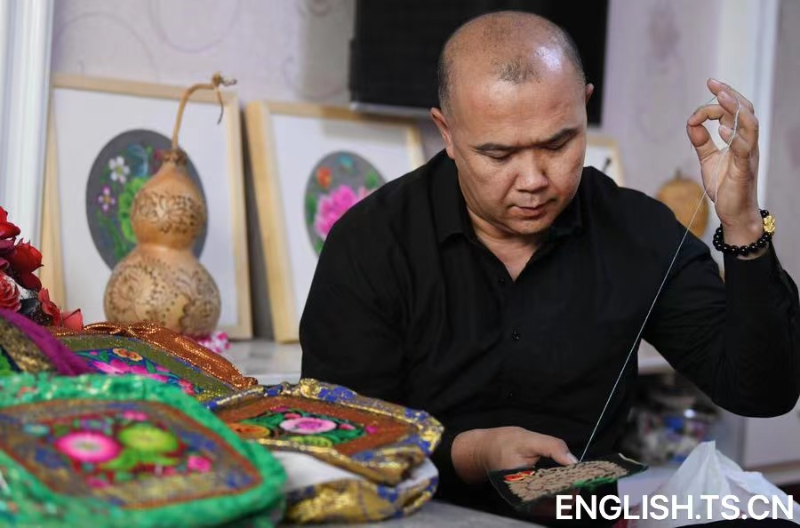On March 5, Chinese Premier Li Qiang delivered the government work report to the second session of the 14th National People's Congress (NPC), China’s top legislature, in Beijing.
Great progress was made in 2023. China’s economy was recovering from the blow dealt by the COVID-19 pandemic, as evidenced by a buoyant consumer market, tourism, and cultural sectors.

On March 5th, 2024, the second session of the 14th National People's Congress (NPC) opened at the Great Hall of the People in Beijing. The photo shows NPC deputies from Xinjiang entering the venue for the meeting.(Photo by Shiliuyun-Xinjiang Daily/Cui Zhijian)
For Xinjiang, the recovery of the culture and tourism sectors is of special importance, since tourism is an important source of income for the region and is also linked to the preservation of local cultural heritage. The efforts of the Xinjiang government to preserve and promote traditional Xinjiang art crafts, together with the development of the tourism industry, have been proven successful and have created many opportunities for local artisans.
The report about the Kader Rehman's Uygur embroidery, which was published on Tianshannet last month, is a good example of how training programs and other simple initiatives can change people's lives for the better: he got rid of poverty by improving his embroidery skills in Guangzhou University.

Integrated into the national consumer market and simultaneously playing a core role in Belt and Road cooperation, Xinjiang is well positioned to benefit from both aspects of the "dual circulation" development paradigm proposed by President Xi Jinping. The fast recovery of China’s consumer market will boost the consumption of products from Xinjiang, while the growth of international trade will bring further investment and opportunities to the region.
The report also emphasizes government policies aimed at stimulating investments in the energy sector, thereby boosting investments in a sector where Xinjiang has unique advantages. With big reserves of oil and gas as well as huge potential for solar and wind power generation, Xinjiang is well positioned to play a prominent role in China’s energy market and make important contributions toward achieving the carbon peaking and carbon neutrality goals.
However,the further development of Xinjiang also implies significant investments in education. Let’s take the oil and gas sector as an example: China recently drilled its first ultra-deep scientific exploration borehole in the Taklamakan Desert. Such technological breakthroughs, along with the modernization of Chinese industrial plants, require a qualified workforce and investments in the development of new technologies.

Now let’s take a look at the perspectives on agriculture. Last year, Xinjiang achieved a cotton picking mechanization rate of over 85 percent. Cotton picking machines outperform human workers in terms of efficiency, thus reducing production costs and requiring skilled workers for their development, production, operation, and maintenance. In addition to this, other agricultural businesses in Xinjiang are also demanding higher levels of professional qualifications, from animal husbandry to the production and transformation of agricultural products, in order to increase the quantity, quality and added value of Xinjiang’s agricultural products.
The Chinese government is committed to building a high-quality education system across all levels and regions, and has promised to increase investments in this sector. Premier Li also announced an initiative aimed at upgrading basic education, improving its quality, bridging the urban-rural gap in compulsory education, and bettering conditions in rural schools. With its vast territory, low population density and rapid urbanization process, Xinjiang will surely benefit from this initiative.
The report also mentions efforts to enrich people's intellectual and cultural lives through innovative cultural projects and improve the services of free public cultural facilities. The fourth national survey of cultural relics will enhance the protection of both material and intangible cultural heritages, contributing to preserving the long history and unique cultural traditions of Xinjiang.
Direction and priorities were provided in the report, but transforming general guidelines into a comprehensive strategy aimed at achieving tangible results is a task that demands significant efforts from the NPC deputies until the end of the "two sessions."
Rafael Henrique Zerbetto is a foreign editor at the Asia-Pacific Center of China International Communications Group.
Producer: Xiao Chunfei
Supervisors: Ding Tao and Jie Wenjin
Planners: Jie Wenjin and Cheng Li
Reviewers: Cheng Li and Hou Weili
Editor: Gvlzar Mijit









